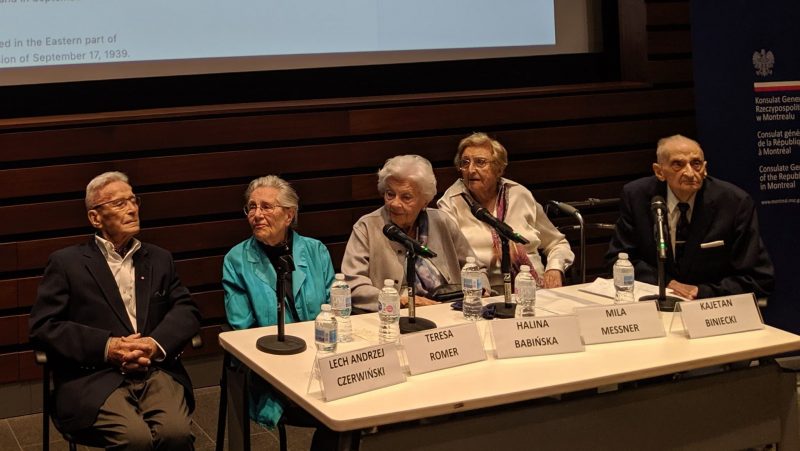On Sept. 10, the Montreal Institute for Genocide and Human Rights Studies and the Consulate General of the Republic of Poland in Montreal hosted a night where survivors shared their most striking memories from World War II.
The idea was orchestrated by Concordia History Professor, Alison Rowley, who wanted to approach the commemoration of such a tragic event in the most humane way possible. The Institute, which is part of the Faculty of Arts and Sciences of Concordia University, brought together five Polish-Canadians; Lech Andrzej Czerwiński, Kajetan Biniecki, Teresa Romer, Mila Messner and Halina Babińska. All five took turns to recount their own experiences of the war.
The context has never been an easy one to recall. Poland first got attacked by Nazi Germans in September 1939. And while struggling to defend its territory it also got attacked by the Soviet Union, under the guise that the Red Army was there to protect its own citizens living in various parts of Poland. War was everywhere.
“When you talk about a place such as [Poland] that lost at least four and a half million of its citizens, when you talk about numbers that size, it’s so big that it’s almost meaningless,” said Dr. Rowley. “It’s hard for human beings to understand anything on that scale, and that’s why evenings like this are so important. Because what we have done here is we [share] memories of individuals, and those stories resonate.”
Rowley argued that shared memories are perhaps more powerful than numbers. And truthfully, one can easily imagine what kind of impact intimately shared recollections of the war have on someone, rather than reading about it in a history book.
Each speaker brought a different angle, yet the same poignant feeling remained throughout the evening. All spoke of the oppressive situation, describing the dark clouds as an omen of disaster as they heard the names of their relatives, through the loudspeakers, being called to never be seen again.
“There were so many aspects of living in this rotten society,” said Messner, who was 16 years old when the war erupted. “You would be afraid of your neighbours, but then you could also be momentarily helped by German soldiers.”
Those individual stories are different lenses of the world, which is what Rowley tried to emphasize. We all have families, friends we care about and we all have seen the strength of the human spirit and the humanity that binds us together, she said.
But probably the most heart-wrenching moment was when Czerwiński, who’s now 97 years old, solemnly recalled his group of friends, one by one, and what horrific fate the war brought upon some of them, while it spared others.
“We were asking, always, the question why all those horrible things were happening,” said Czerwiński. “We decided that war was inevitable. So whatever would come, we would attempt to survive [these horrible times]. But each attempt to prevent provocation would result in the murder of at least 10 citizens. The only way to survive these horrors was to have a clear mind and to think properly. It’s the only answer I can give you.”
Photo by Virginie Ann




